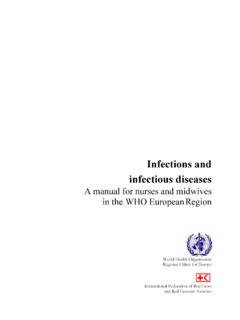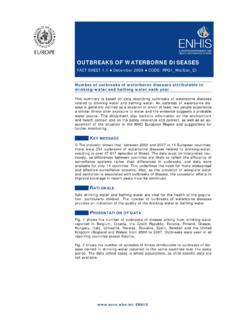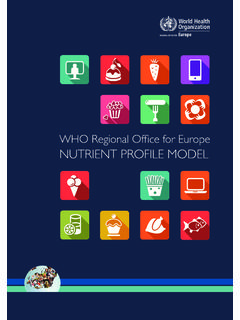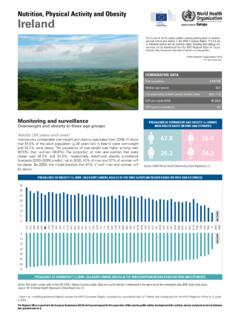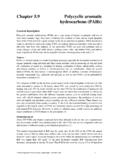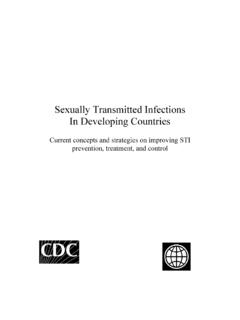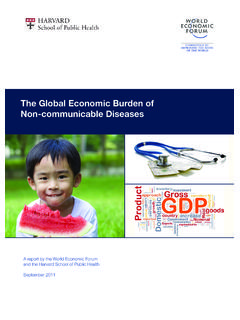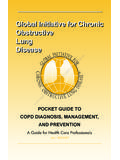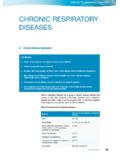Transcription of Are disease management programmes (DMPs) effective in ...
1 Are disease management programmes (DMPs) effective in improving quality of care for people with chronic conditions? August 2003 2 ABSTRACT health Evidence Network (HEN) synthesis report on disease management programmes chronic diseases account for most of the burden of disease in the European Region. Although there are effectiveinterventions for the management of various chronic conditions, there are also wide practice variations in thedelivery of care. DMPs are one of the measures intended to address this situation. DMPs organize care inmultidisciplinary, multicomponent programmes , in a proactive approach focusing on the whole course of achronic disease , using evidence-based standards of care.
2 This report is HEN s response to a question from a decision-maker. It provides a synthesis of the best available evidence, including a summary of the main findings and policy options related to the issue. HEN, initiated and coordinated by the WHO Regional Office for Europe, is an information service for public health and health care decision-makers in the WHO European Region. Other interested parties might alsobenefit from HEN. This HEN evidence report is a commissioned work and the contents are the responsibility of the authors. They do not necessarily reflect the official policies of WHO/Europe. The reports were subjected to international review, managed by the HEN team.
3 When referencing this report, please use the following attribution: Velasco-Garrido M, Busse R, Hisashige A (2003). Are disease management programmes (DMPs) effective inimproving quality of care for people with chronic conditions?Copenhagen, WHO Regional Office for Europe ( health Evidence Network report; , accessed [day month year]). Keywords QUALITY OF health CARE chronic disease THERAPY DELIVERY OF health CARE EVALUATION STUDIES NATIONAL health PROGRAMS DECISION SUPPORT TECHNIQUES EUROPE Address requests about publications of the WHO Regional Office to: by e-mail (for copies of publications) (for permission to reproduce them) (for permission to translate them) by post Publications WHO Regional Office for Europe Scherfigsvej 8 DK-2100 Copenhagen , Denmark World health Organization 2003 All rights reserved.
4 The Regional Office for Europe of the World health Organization welcomes requests for permission to reproduce or translate its publications, in part or in full. The designations employed and the presentation of the material in this publication do not imply the expression of any opinion whatsoever on the part of the World health Organization concerning the legal status of any country, territory, city or area or of its authorities, or concerning the delimitation of its frontiers or boundaries. Where the designation country or area appears in the headings of tables, it covers countries, territories, cities, or areas. Dotted lines on maps represent approximate border lines for which there may not yet be full agreement.
5 The mention of specific companies or of certain manufacturers products does not imply that they are endorsed or recommended by the World health Organization in preference to others of a similar nature that are not mentioned. Errors and omissions excepted, the names of proprietary products are distinguished by initial capital letters. The World health Organization does not warrant that the information contained in this publication is complete and correct and shall not be liable for any damages incurred as a result of its use. The views expressed by authors or editors do not necessarily represent the decisions or the stated policy of the World health Organization. Are disease management programmes (DMPs) effective in improving quality of care for people with chronic conditions?
6 WHO Regional Office for Europe s health Evidence Network (HEN) August 2003 3 Summary .. 4 The 4 Findings .. 4 Policy 4 Introduction .. 5 Sources for this review .. 6 Findings .. 6 Other aspects .. 8 Conclusions .. 10 Policy 11 References .. 12 Annex 1: Synthesis 14 Annex 2: A review of included and excluded studies in this synthesis report .. 15 Are disease management programmes (DMPs) effective in improving quality of care for people with chronic conditions? WHO Regional Office for Europe s health Evidence Network (HEN) August 2003 4 Summary The issue chronic diseases account for most of the burden of disease in the European Region. Although there are effective interventions for the management of various chronic conditions, there are also wide practice variations in the delivery of care.
7 DMPs are one of the measures intended to address this situation. DMPs organize care in multidisciplinary, multicomponent programmes , in a proactive approach focusing on the whole course of a chronic disease , using evidence-based standards of care. Findings Most of the evaluated DMPs for chronic conditions have been shown to improve the management and control of the disease . There is a wide body of evidence on this for diabetes, depression, chronic heart failure and cardiovascular diseases. There is evidence that DMPs improve providers adherence to evidence-based standards of care. There is no evidence about which components of a DMP are most important for improving quality of care.
8 There is no evidence of a direct link between DMPs and significant reductions in mortality or of improvements in quality of life. There is no evidence on DMPs cost-effectiveness. Policy considerations There is a need to improve the quality of care for people with chronic diseases. DMPs will achieve this goal for chronic conditions such as diabetes, depression, chronic heart failure and cardiovascular diseases. Although there is a clear link between improved management of chronic conditions and better health outcomes, there is no scientific evidence that specific DMPs improve the survival rate or quality of life. However, the absence of evidence does not mean absence of effect; it means it has not been studied.
9 Investments in DMPs may be costly. Therefore it is important to study the cost-effectiveness of any DMP before it is introduced on a large-scale. Are disease management programmes (DMPs) effective in improving quality of care for people with chronic conditions? WHO Regional Office for Europe s health Evidence Network (HEN) August 2003 5 The authors of this HEN synthesis report are: Marcial Velasco-Garrido, MD Technische Universit t Berlin Institute of health Sciences Dept. of health Care management EB2, Strasse des 17. Juni 145 10623 Berlin, Germany Tel: +49 30 314-28419 Fax: +49 30 314-28433 Reinhard Busse Professor of health Care management Dept. health Care management , Institute of health Sciences Technische Universit t Berlin and European Observatory on health Care Systems, Berlin Hub EB2, Strasse des 17.
10 Juni 145 10623 Berlin, Germany Tel: +49 30 314-28420 Fax: +49 30 314-28433 Akinori Hisashige, MD, PhD Director The Institute of Healthcare Technology Assessment 2-24-11 Shomachi, Tokushima 770 0044 Japan Tel: +81 88 631 6727 Introduction health care systems across the world are concerned with continuity of care, avoidance of medical errors, patient safety, effective delivery of services, and avoiding excessive variations in practice (1). Many countries in the World health Organization European Region have implemented national quality strategies, such as accreditation systems, hospital quality management (for example by Total Quality management , European Foundation for Quality management ) or external assessments such as league tables or audits (2,3).
